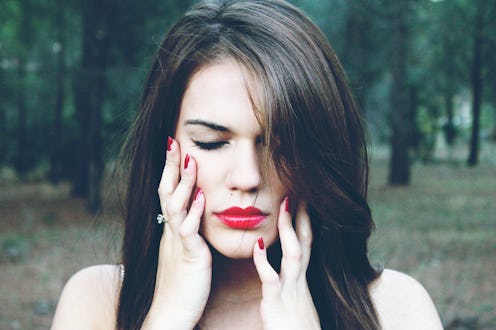Fashion
9 Things You Should Never Use On Your Skin

With hundreds of Pinterest boards and blogs offering DIY skincare tips and tricks, achieving radiant, blemish free skin without spending a fortune on serums and treatments is a popular endeavor. As tempting as home solutions can be, many quick-fix tutorials are riddled with things you should never use on your skin.
You may have been guilty of religiously using toothpaste to clear your acne back in middle school or covering yourself in vaseline when you were out of moisturizer. And you probably thought there was no harm in being a DIY dermatologist since many home remedies call for products we already consume or use on our bodies in other ways. But turning to grocery aisles for all of your skin care needs should be totally out of the question. As it turns out, the same breakouts and dark spots you're hoping to control might only be worsened by things that have no business being slathered onto your skin.
Straight from a dermatologist's mouth, we've got the low down on some of the household ingredients constantly praised on beauty blogs for use on your skin. Avoid the risk of pesky breakouts, irritation, or allergic reactions altogether by scrapping these nine ingredients from your beauty routine.
1. Baking Soda
You may notice that many DIY face masks call for using baking soda. Although this ingredient is endorsed as a gentle exfoliant, it can be very damaging to your skin. Dr. Janet H. Prystowsky, President of Janet H. Prystowsky MD and Livad Skin Care, tells Bustle via email that baking soda's pH of 8.3 is what makes it harmful for our bodies. "It will counteract the normal acidity of the skin, making the enzymes and skin flora change," she says. "When skin flora changes, the skin becomes more prone to infection."
2. Lemon Juice
Think twice before using lemon juice to lighten dark spots. "The low pH of lemon juice can burn your skin," says Dr. Prystowsky. Increased peeling and inflammation of the skin caused by the high acidity of lemons is definitely not worth it, no matter how annoying your dark spots may be.
3. Toothpaste
Toothpaste was never designed to be used on the face, yet you've probably heard so many times that you could use it as a spot treatment to dry out acne. Well, that's a definite no no.
"Toothpaste is alkaline and has flavoring in it," explains Dr. Prystowsky. "There is nothing therapeutic about it for the skin. If there is fluoride in it, then complexion can react badly to it."
4. Hairspray
It may be tempting to grab your hairspray in a pinch when you're down to that last squirt of makeup setting spray. But it's not a good idea to put hairspray anywhere near the eyes and nose. "There are propellants and other chemicals in hairspray that are harmful if inhaled," mentions Dr. Prystowsky.
5. Hot Water
As enticing as a steaming hot shower sounds, it's not the ideal temperature for cleansing your skin. "It can cause a thermal burn and will melt away your natural oils," says Dr. Prystowsky. She recommends using water that is approximately 100 degrees Fahrenheit when bathing.
6. Sugar
Similar to baking soda, using sugar for a DIY exfoliant can be a disaster for your skin. "Sugar is a sharp angulated crystal that can cut into the skin. It is scratchy and will disrupt your skin cells causing injury," warns Dr. Prystowsky. Yikes!
7. Rubbing Alcohol
Just because rubbing alcohol seems to dry out pimples doesn't mean it can take the place of a dermatologist recommended acne treatment. Dr. Michael Swann, MD, of Swan Dermatology explains via email that alcohol may be used for skin prep before applying other treatments, but its inflammatory properties make it harmful for routine use.
"As an irritant, it is painful when applied to abraised or irritated skin," he says. "Generally speaking, this might at best improve a specific pimple's appearance but negatively affect the surrounding skin and lead to more inflammation and pimpling."
8. Petroleum Jelly
We've all probably been there and done that when it comes to substituting vaseline for lotion, moisturizer, or chapstick. It happens! Even though it seems hydrating, petroleum jelly does have its pitfalls. "Ointment like petroleum is greasy and is basically a barrier," Dr. Swann says. "I recommend it for chapped lips, but not as a routine moisturizer because it can block pores and thus is comedogenic."
9. Vinegar
Vinegar contains acetic acid, making it harmful for your skin when used in DIY face masks to clarify the skin. "The acid mantle of the skin is chemically protective as it maintains an acidic pH around 5," explains Dr. Swann. "Vinegar, like baking soda, is a base. Neutralizing the pH will also neutralize the protective effect of the acid mantle which can cause yeast and bacteria to overgrow and disrupts the skin's physical protective barrier."
Natural skin care and DIY remedies can be cost effective and beneficial, but it's all a matter of understanding their effects in the long run. Consulting an expert before using household ingredients on your body may save you the trouble of finding out the hard way what works and what really doesn't.
Images: Maria Victoria Heredia Reyes, Tirza van Dijk, Nico Beard, Isabell Winter/Unsplash; evitaochel (2), stevepb, 955169/Pixabay; Getty; Voyagerix, jirakit/Fotolia